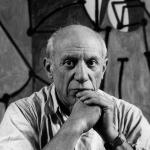Background
Max Jacob was born on July 12, 1876 in Quimper, Brittany. He spent his childhood in Quimper.







Max Jacob was born on July 12, 1876 in Quimper, Brittany. He spent his childhood in Quimper.
He enrolled in the Paris Colonial School, which he left in 1897 for an artistic career.
He was one of the first friends Pablo Picasso made in Paris. They met in the summer of 1901, and it was Jacob who helped the young artist learn French. Later, on the Boulevard Voltaire, he shared a room with Picasso, who remained a lifelong friend (and was included in his artwork Three Musicians).
Jacob introduced him to Guillaume Apollinaire, who in turn introduced Picasso to Georges Braque. He also befriended and encouraged the artist Romanin, otherwise known as French politician and future Resistance leader Jean Moulin. Moulin's famous nom de guerre Max is presumed to be selected in honor of Jacob.
Having moved outside of Paris in May, 1936, to settle in Saint-Benoît-sur-Loire, Loiret, Max Jacob was arrested on 24 February 1944 by the Gestapo, and interned at Orléans prison. Following his incarceration at Orléans, Max was then transferred to Drancy internment camp from where he was to be transported in the next convoy to Auschwitz in Poland. However, said to be suffering from bronchial pneumonia, Max Jacob died in the infirmary of Le Cité de la Muette, a former housing block which served as the internment camp known as Drancy on 5 March.
As well as his nom d'état civil, or regular name, Jacob worked under at least two pseudonyms, Léon David and Morven le Gaëlique.
Max Jacob is regarded as an important link between the symbolists and the surrealists, as can be seen in his prose poems Le cornet à dés (The Dice Box, 1917 – the 1948 Gallimard edition was illustrated by Jean Hugo) and in his paintings, exhibitions of which were held in New York City in 1930 and 1938. His writings include the novel Saint Matorel (1911), the verses Le laboratoire central (1921), and Le défense de Tartuffe (1919), which expounds his philosophical and religious attitudes. The famous psychoanalyst Jacques Lacan attributed the quote "The truth is always new" to Jacob.
Quotations: "Friendship is inexplicable, it should not be explained if one doesn't want to kill it."

